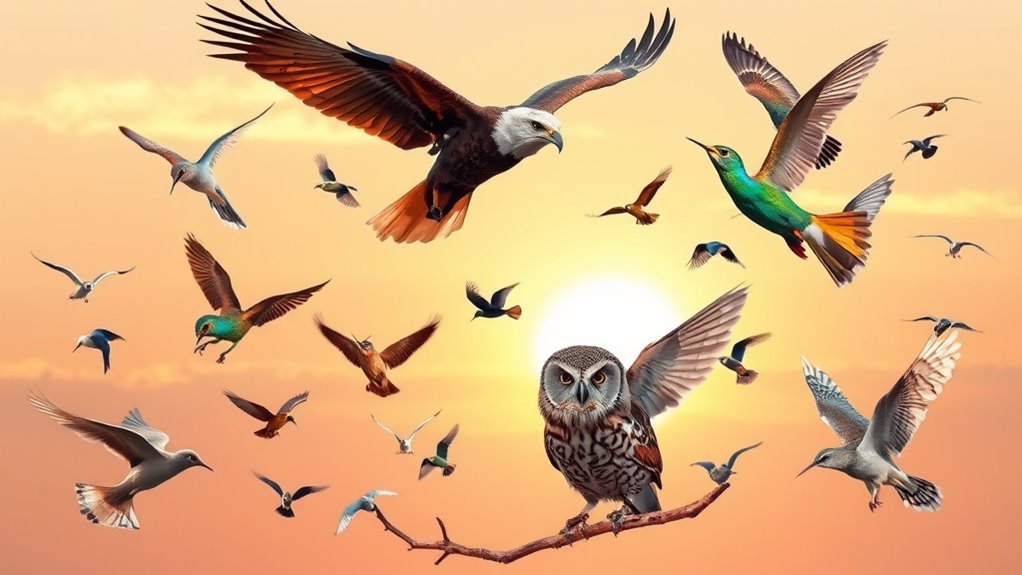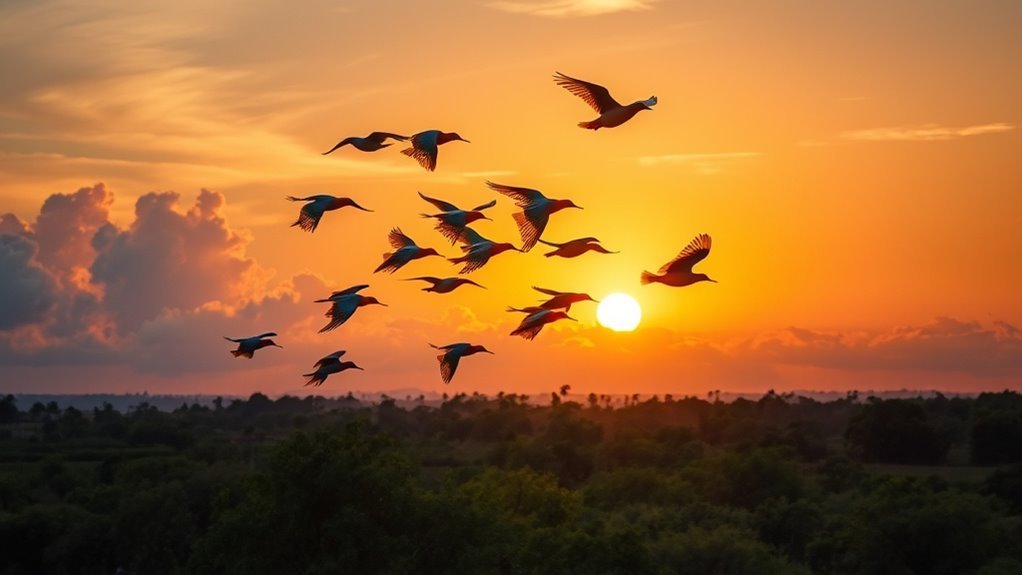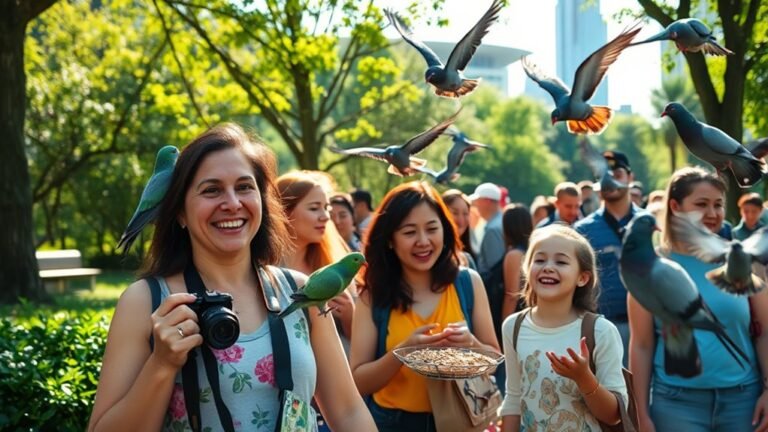Birds and Their Meanings: An Overview
Birds symbolize freedom and change in many cultures. They can show us signs of environmental shifts through their actions and movements. Each bird species has its own meaning that connects to personal growth. Learning about these meanings can help you value the role of birds in our lives. As you notice birds and their behaviors, think about how they affect how we see the world and how we act. Their presence can offer surprising insights into our experiences.
Key Takeaways
- Birds symbolize freedom and transformation, serving as omens that provide spiritual guidance through their appearances and behaviors.
- Different birds like hawks and doves carry specific meanings, such as clarity and peace, connecting to personal journeys.
- Cultural significance of birds includes rituals that reinforce community values and shared experiences related to nature.
- Birds are vital to ecosystems, acting as pollinators and indicators of environmental health, emphasizing the need for conservation efforts.
- Bird watching promotes mental well-being and fosters appreciation for nature, contributing to environmental education and citizen science initiatives.
The Spiritual Significance of Birds

Birds hold special spiritual meaning in many cultures, symbolizing freedom, transformation, and the link between the physical and spiritual worlds.
You may notice specific birds appearing during key moments in your life; these can be bird omens. They may provide spiritual guidance, offering insights or affirming your path.
For example, a hawk can indicate clarity and keen vision, encouraging you to pay close attention to your environment. On the other hand, a dove may represent peace and harmony, helping you feel secure in difficult times.
Birds as Symbols of Freedom
Birds represent freedom in many cultures. When you see birds flying, you notice their spirit, symbolizing release from limits. This connection between flight and freedom resonates with your need for independence and self-expression.
Birds like eagles and swans perfectly illustrate this idea, their graceful movements inspire a sense of limitless potential. The act of flying involves simple mechanics of wings and air, showcasing the principles of escape and liberation.
As you reflect on this symbolism, think about how these birds represent your own goals for personal growth, encouraging you to break free from constraints and live fully with an open heart.
The Role of Birds in Different Cultures

Many cultures view birds as important symbols. They represent traits like transformation, freedom, and wisdom. In different societies, people have different beliefs about birds that reflect their local values.
Bird rituals, such as those for migration or harvest, showcase how communities connect with nature and life's cycles. These activities build a sense of belonging as people gather to celebrate the role of birds in their lives.
Common Birds and Their Meanings
Many people overlook common birds, but these creatures hold meaningful connections to human feelings and experiences. Their symbolism can resonate with your life in significant ways:
- Sparrows represent community and belonging.
- Doves evoke peace and love.
- Owls signify wisdom and intuition.
- Hummingbirds symbolize joy and resilience.
The eagle represents inner strength.
The crow encourages you to think creatively.
When you see a robin, think of renewal and new beginnings.
The peacock reminds you to appreciate your uniqueness.
These interpretations can deepen your understanding and help you connect with nature around you.
The Symbolism of Migratory Birds

Migratory birds travel long distances each year, representing change and flexibility.
They follow specific routes based on the seasons, showing their skill in moving through different habitats. Their journeys often indicate shifts in the environment, affecting local ecosystems and human activities.
Watching these birds fly can remind us of nature's rhythms and the importance of resilience. Their movements also symbolize hope, encouraging us to adjust to life's many changes.
Understanding this symbolism helps us connect with nature and ourselves.
Birds in Mythology and Folklore
Birds have fascinated cultures worldwide for centuries. They serve as important symbols in various myths and folktales. These creatures often carry deep meanings related to life, death, and the unknown.
Many mythical birds exist, each with unique significance. The phoenix symbolizes rebirth. The harpy represents danger and transformation.
Other notable birds include:
- The griffin, known as a guardian of treasure.
- The owl, representing knowledge and vigilance.
- The siren, combining beauty with peril.
- The raven, often seen as a sign of change.
These birds enrich folklore and connect people through shared stories. They evoke a sense of wonder and reflection, reminding us of universal human experiences.
How Birds Influence Human Emotions
As you watch birds in their natural habitats, you may feel a range of emotions, like peace or nostalgia.
Birdwatching offers benefits beyond simple enjoyment. Studies show that observing birds creates emotional connections, helping you feel closer to nature. These connections develop as you see different bird species, often reminding you of personal memories.
The soothing sounds of chirping or the sight of a hawk can lift your spirits, reduce stress, and promote mindfulness.
Therefore, engaging with birds not only improves your surroundings; it also supports your emotional well-being, highlighting the strong link between humans and nature.
The Importance of Birds in Nature
Birds play a vital role in nature. They're key to many ecosystems and help keep ecological balance. Their activities, like nesting and migration, support bird diversity and overall biodiversity.
- Birds pollinate plants, helping them grow.
- They control pests, which benefits farms and human health.
- Their presence shows the health of habitats, guiding conservation efforts.
- The relationships between birds and their prey demonstrate nature's balance.
Learning about birds and their importance in the environment strengthens our connection to nature. It inspires us to protect them and fosters a sense of belonging in our shared world.
Birds as Messengers of Change
Birds are important indicators of environmental changes. Their migration patterns signal the arrival of different seasons and show how they adjust to climate changes.
You may notice that certain bird sightings align with shifts in culture, marking key moments in our connection to nature. These birds symbolize transformation and remind us of personal growth we may experience.
As you watch their life cycles, think about how they reflect your own experiences and the environmental changes you encounter. Each chirp or flutter represents nature's rhythms and also the changes happening within you and in your surroundings.
The Connection Between Birds and Personal Growth
Birds symbolize personal growth because of their ability to adapt and transform. Your journey mirrors their flight, reflecting personal change and self-discovery.
Just as each bird fulfills its potential, you can find inspiration in them to learn from life and build resilience.
- Have the courage to leave your nest behind.
- Experience joy as you reach for new horizons.
- Discover strength in taking time to observe.
- Appreciate the beauty of growth through challenges.
The Influence of Specific Bird Species
Bird species often represent traits that connect with human experiences. For example, the eagle stands for strength and vision, while the dove symbolizes peace.
These traits influence societal views and reflect shared cultural meanings. Each bird carries significance based on history, helping communities feel connected.
Cultures worldwide admire the hummingbird for its joy and agility, linking these qualities to positive life moments.
Understanding these associations can help you relate to others and shape your goals, drawing inspiration from birds that reflect your feelings and journey.
Conservation and the Future of Bird Symbolism
As people face environmental challenges, bird symbolism becomes more important. Observing nature enhances our understanding of bird conservation.
- Birds indicate ecosystem health.
- They symbolize hope and freedom in culture.
- Watching species decline carries emotional weight.
- Communities work together to protect bird diversity.
Recognizing these connections improves your appreciation for birds. As their populations face threats, bird symbolism changes.
This prompts you to consider your role in conservation. Embracing this knowledge fosters a stronger bond with nature and creates a feeling of belonging in the global community dedicated to saving our feathered friends.
Frequently Asked Questions
How Do Birds Affect Local Ecosystems and Biodiversity?
Birds have a significant impact on local ecosystems. They help plants grow by spreading seeds, which increases plant diversity. Birds also play a crucial role in the balance of predator and prey relationships within their habitats. By understanding these roles, we can better appreciate what birds contribute to the environment and feel more connected to our communities.
What Are Common Birdwatching Tips for Beginners?
To begin birdwatching, use binoculars for clear views of birds. Refer to field guides to help identify different species. Keep a notebook to record your sightings. Join local birdwatching groups to improve your skills and meet other bird lovers. Enjoy the experience of observing nature!
How Can I Attract Birds to My Garden?
To attract birds to your garden, install bird feeders filled with seeds. Choose native plants that offer food and shelter. This mix helps create a diverse and inviting space for different bird species.
What Are the Best Practices for Bird Conservation?
To conserve birds effectively, involve your community in restoring habitats. Plant native species and remove invasive plants. Work with local organizations to build a shared purpose. This collaboration encourages practices that support everyone and benefit the environment.
How Can Bird Sounds Impact Our Mental Well-Being?
Bird songs improve your mental well-being. They calm you, lower stress, and boost your mood. Listening to bird sounds helps you connect with nature. This connection supports your emotional health and creates a feeling of belonging in your surroundings. Enjoying these sounds can lead to a happier and more balanced life.

Hello, I’m Emily Price, the founder of Birds Affection. As a passionate bird enthusiast and spiritual seeker, I’ve always been fascinated by the symbolic meanings and mystical connections between birds and our lives. On this website, I share my knowledge and insights on the spiritual significance of various bird species, exploring their roles as messengers, guides, and teachers. Through my writing, I aim to inspire and educate others on the profound wisdom and beauty that birds bring to our world. Join me on this journey as we delve into the enchanting realm of bird symbolism and discover the hidden meanings behind these magnificent creatures.







